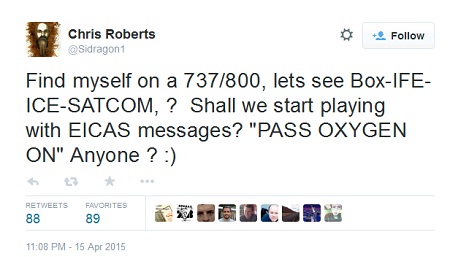A security researcher was questioned by the FBI and banned from boarding a plane after he posted a message on Twitter about hacking into an aircraft’s systems.
While on a United Airlines flight to Syracuse, New York, Chris Roberts, security researcher and founder of the enterprise security assessment and consulting firm One World Labs, made a joke tweet about accessing the communication systems and the engine-indicating and crew-alerting system (EICAS) of the Boeing 737-800 he was on.

As soon as he landed in Syracuse, the researcher was detained by the FBI. Agents questioned Roberts for four hours and seized most of his electronics.
A few days later, when he wanted to board a United Airlines flight to San Francisco, where he is scheduled to give a talk this week on the “Security Hopscotch” at the RSA Conference, he was stopped from getting on the plane by the airline’s security personnel.
“United’s refusal to allow Roberts to fly is both disappointing and confusing. As a member of the security research community, his job is to identify vulnerabilities in networks so that they can be fixed,” the Electronic Frontier Foundation (EFF), whose lawyers represent Roberts in this case, wrote in a blog post.
Over the past years, Roberts has dedicated much of his time to investigating aircraft security. However, the researcher says he is displeased with the “lack of response” from the aviation industry.
“EFF has long been concerned that knee-jerk responses to legitimate researchers pointing out security flaws can create a chilling effect in the infosec community,” the EFF said. “EFF’s Coders’ Rights Project is intended to provide counseling and legal representation to individuals facing legal threats, which is why we’re glad to represent Chris Roberts. However, we’d also like to see companies recognize that researchers who identify problems with their products in order to have them fixed are their allies. It would avoid a whole lot of trouble for researchers and make us all more secure.”
Last week, the Government Accountability Office (GAO) published a report detailing the challenges faced by the Federal Aviation Administration (FAA) as it transitions to next generation air transportation systems. The report warns that Internet connectivity could expose aircraft to cyberattacks.
While security experts have often warned about the vulnerabilities affecting aircraft systems, airplane manufacturers say it’s not an easy task to hack the most critical and essential functions. In response to the latest GAO report, Boeing pointed out that in-flight entertainment (IFE) systems are isolated from flight and navigation systems.














